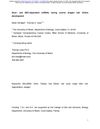 32 citations,
September 2016 in “Dermatologic Surgery”
32 citations,
September 2016 in “Dermatologic Surgery” The evidence for using Low-Level Laser Therapy for hair loss is limited and more thorough research is needed.

675 nm laser therapy effectively improves hair growth in Indian patients with androgenetic alopecia.
 8 citations,
April 2020 in “Journal of Ethnopharmacology”
8 citations,
April 2020 in “Journal of Ethnopharmacology” Herbs might help with hair loss, but more research is needed to confirm their safety and effectiveness.
 April 2024 in “bioRxiv (Cold Spring Harbor Laboratory)”
April 2024 in “bioRxiv (Cold Spring Harbor Laboratory)” GRK2 is essential for healthy hair follicle function, and its absence can lead to hair loss and cysts.
 July 2022 in “Research Square (Research Square)”
July 2022 in “Research Square (Research Square)” Certain miRNAs may play a role in sheep hair follicle development, which could help improve wool production.
 149 citations,
July 2014 in “Cold Spring Harbor Perspectives in Medicine”
149 citations,
July 2014 in “Cold Spring Harbor Perspectives in Medicine” The dermal papilla is crucial for hair growth and health, and understanding it could lead to new hair loss treatments.
 2 citations,
December 2023 in “Current Pharmaceutical Biotechnology”
2 citations,
December 2023 in “Current Pharmaceutical Biotechnology” Nanocarriers can improve the effectiveness of herbal medicines in treating colorectal cancer.
 November 2023 in “bioRxiv (Cold Spring Harbor Laboratory)”
November 2023 in “bioRxiv (Cold Spring Harbor Laboratory)” Disrupted cholesterol production impairs hair follicle stem cells, leading to hair loss.
 4 citations,
January 2020 in “Cells”
4 citations,
January 2020 in “Cells” The research found that the gene activity in mouse skin stem cells changes significantly as they age.
 8 citations,
May 2021 in “Bioengineering & translational medicine”
8 citations,
May 2021 in “Bioengineering & translational medicine” Hair growth environment recreated with challenges; stem cells make successful skin organoids.
 12 citations,
December 2017 in “Journal of Investigative Dermatology Symposium Proceedings”
12 citations,
December 2017 in “Journal of Investigative Dermatology Symposium Proceedings” Platelet-rich plasma and microneedling could potentially help hair growth in people with alopecia areata, but more research is needed.
2 citations,
September 2023 in “International journal of molecular sciences” Special proteins are important for skin balance, healing, and aging, and affect skin stem cells.
 23 citations,
January 2021 in “Biomedicine & Pharmacotherapy”
23 citations,
January 2021 in “Biomedicine & Pharmacotherapy” DHT stops hair regrowth in mice, similar to human hair loss.
 8 citations,
January 2022 in “Burns and trauma”
8 citations,
January 2022 in “Burns and trauma” Skin cell-derived vesicles can help heal skin injuries effectively.
2 citations,
February 2021 in “Case reports in dermatological medicine” The new topical botanical formulation significantly regrew hair in all five patients without side effects.
 16 citations,
January 2018 in “Biochemical and Biophysical Research Communications”
16 citations,
January 2018 in “Biochemical and Biophysical Research Communications” Researchers created five new human scalp cell lines that could be useful for hair growth and loss research.
July 2024 in “International Journal of Molecular Sciences” RF-based therapies might help treat hair loss.
 1 citations,
August 2021 in “Frontiers in Genetics”
1 citations,
August 2021 in “Frontiers in Genetics” Certain genes related to sulfur metabolism are more active during the growth phase of Cashmere goat wool, and melatonin might help this process.
 191 citations,
September 2011 in “Cell stem cell”
191 citations,
September 2011 in “Cell stem cell” Hair follicle stem cells use specific chromatin changes to control their growth and differentiation.
 February 2023 in “International Journal of Molecular Sciences”
February 2023 in “International Journal of Molecular Sciences” Exosomes from skin cells can boost hair growth by stimulating a gene called LEF1.
 76 citations,
August 2018 in “International Journal of Cosmetic Science”
76 citations,
August 2018 in “International Journal of Cosmetic Science” Dermal Papilla cells are a promising tool for evaluating hair growth treatments.
 1 citations,
November 2017 in “Journal of Investigative Dermatology”
1 citations,
November 2017 in “Journal of Investigative Dermatology” Platelet-rich plasma and microneedling could potentially help hair regrowth in alopecia areata patients, but more research is needed.
 4 citations,
January 2021 in “Archives of dermatological research”
4 citations,
January 2021 in “Archives of dermatological research” The study created a new model to better understand human hair growth and health.
6 citations,
April 2023 in “Cosmetics” Exosomes could be effective for improving skin health and treating skin diseases.
 1 citations,
January 2020 in “bioRxiv (Cold Spring Harbor Laboratory)”
1 citations,
January 2020 in “bioRxiv (Cold Spring Harbor Laboratory)” Dicer is crucial for hair growth in mice.
1 citations,
February 2023 in “Plants” BB4CMU rice bran oil may help treat hair loss and gray hair.
 31 citations,
May 2008 in “Drug Discovery Today: Disease Mechanisms”
31 citations,
May 2008 in “Drug Discovery Today: Disease Mechanisms” Different hair growth problems are caused by genetic issues or changes in hair growth cycles, and new treatments are being developed.
 July 2024 in “International Journal of Molecular Sciences”
July 2024 in “International Journal of Molecular Sciences” Nannochloropsis salina fermented oil may help treat hair loss by promoting hair growth and reducing oxidative stress.
 61 citations,
September 2010 in “Genomics”
61 citations,
September 2010 in “Genomics” The study found that immune responses disrupt hair growth cycles, causing hair loss in alopecia areata.
41 citations,
February 2021 in “Translational research” Non-coding RNAs could help detect and treat radiation damage.
























